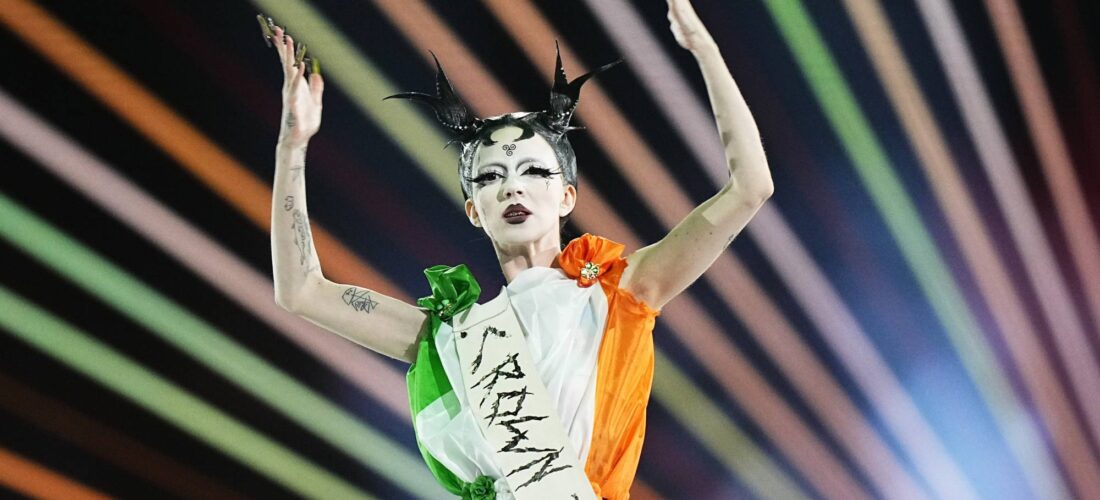Bambie Thug declares ‘Fuck the EBU’ in post-Eurovision press interview
Bambie Thug has spoken out against the EBU during post-Eurovision interviews, claiming that they don’t fully represent “what Eurovision is”.
The self-described ‘ouija-pop’ artist came sixth in the annual contest, which was won by Switzerland representative Nemo. At the end of their performance, they proclaimed “Love will triumph over hate!”
The Cork singer has also faced significant challenges throughout the competition due to their pro-Palestinian stance. It was revealed they were forced to remove the words ‘ceasefire’ and ‘freedom for Palestine’ in a medieval script from their costume due to Eurovision’s political neutrality clause. A now-deleted TikTok showed Bambie reacting to the decision, telling the camera: “It’s fucked up”.
Now, they have criticised the EBU in more direct terms and also revealed that the atmosphere around this year’s controversial edition of the contest had been “so hard and so horrible”.
[embedded content]
“I’m so proud of Nemo winning,” they said, sounding close to tears. “I’m so proud that all of us are in the top 10 that have been fighting for this shit behind the scenes because it has been so hard and so horrible for us. I’m so proud of us.
“i just want to say,” they continued, “we are what the Eurovision is. The EBU is not what the Eurovision is. Fuck the EBU. I don’t even care anymore. Fuck them. The thing that makes this is the contestants, the community behind it, the love and the power and the support of all of us is what is making change.
Recommended
They concluded: “The world has spoken. The queers are coming. Non-binaries for the fucking win.”
Bambie Thug speaks to media after placing sixth in the Eurovision Song Contest. They said they are proud of Nemo for winning as a non-binary person. They said it has been “so hard and so horrible” behind the scenes.
“The EBU is not what the Eurovision is. Fuck the EBU.” pic.twitter.com/829ggJTI9x
— Irish Examiner (@irishexaminer) May 12, 2024
On the day of the contest, they lodged a complaint with the Eurovision organisers due to commentary made by Israeli broadcaster KAN. The comments, which told viewers to “prepare your curses” and claim Bambie’s performance was “the most scary” of the night, were labelled “in breach of the rules” of the EBU by Bambie.
They later claimed that the EBU “confirmed” KAN had breached the rules, which “contradicts” a statement they had seen from the EBU Director General Noel Curran.
This year’s competition has been dogged with controversy due to the EBU’s decision to include Israel amongst the Israel-Palestine conflict. Israel’s entry also stoked further controversy due to the original lyrics of their song, initially titled ‘October Rain’. Performed by Eden Golan, it appeared to contain references to the victims of Hamas’ October 7 attacks and was barred from performance due to breaking rules on political neutrality.
Israel was finally confirmed to compete after changes were made to the lyrics and the song’s title was changed to ‘Hurricane’.
Recently, the organisers doubled down on their choice, with the EBU saying: “I fully agree it is a family event and the great thing about this music competition is that it’s all about values. It’s about uniting onstage all of these young talents, these participants, and they do great. It’s about diversity and inclusion.
“But there are competition rules and you need to follow the competition rules and take decisions based on these competition rules. If you were to exclude Kan outside of these competition rules, that would have been a political decision, as such, which we cannot take.”
The EBU’s decision has also proved controversial amongst longtime Eurovision fans, who NME interviewed before the competition tonight. Though Jay Aston from former UK Eurovision-winning group The Fizz (fka Buck’s Fizz) said she would be watching, other fans such as musician Jason Kwan have expressed doubt over the competition’s political neutrality clause.
Kwan claimed Eurovision was “inherently and explicitly political” due to the EBU’s decision to include Israel and to censor “pro-Palestinian artists, and even outwardly using the official social account to like problematic posts and block accounts who have provided genuine critique and questions around the EBU’s decisions.”
